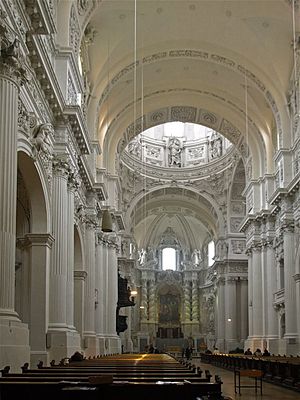On this day, along with Pope Sixtus and his companion martyrs, we honour Saint Gaetano Cajetan (1480-1547), not to be confused with the ‘other’ Cajetan, whose name was Thomas, a famed commentator on Saint Thomas Aquinas (who lived around the same time). Rather, this Cajetan – Gaetano, in Italian – was a true reformer in the time of the inaptly named Protestant ‘reformation’. He was a lawyer, a medical worker and a priest, who for a time was a diplomat for Julius II, the war-mongering Pope who purportedly spent more time defending the papal states than defending the Faith. We may presume that Cajetan took up this task with some degree of resignation, even consternation.
We glean this from the fact that he resigned forthwith upon the pope’s death in 1522, and began a more contemplative life, working with the sick and the poor. In 1524, with the approval of Pope Clement VII (the one who dithered over Henry VIII’s annulment to Catherine of Aragon), Cajetan, with Giovanni Pietro Caraffa (later Pope Paul IV) helped found the religious order of the Theatines, named after the city of Chieti where they arose (their more accurate and full name is the ‘Congregation of Clerics Regular of the Divine Providence’). They grew slowly, since their members could neither own property, nor beg alms, which limited their members to those with their own ‘means’, that is, members of the nobility. But they did great work, and the Theatines were one of a group of new Orders (primary amongst them, the Society of Jesus) which helped renew, revitalize and truly reform the Church during the tumultuous 16th century.
After a fruitful life, Cajetan died on this day, August 7th, 1547, and was canonized on April 12th, 1671, by Pope Clement X. The Theatines are still going, with about 34 houses across the world, and 170 members, most of whom are priests. Here is the splendorous church of Saint Cajetan, in Munich, Germany, a testament to the devotion in which this saint was once held. The church now run by the Dominicans (whose founder’s feast is tomorrow). I can’t imagine it’s very full on any given Sunday in the spiritual wasteland that Deutschland has become, but its glory stands a testament to the Faith that was, and may, in some way in the mystery of God’s providence, be again:

(wikipedia.org)
Saint Cajetan and all holy Theatins, orate pro nobis!
(Source: wikipedia.org)


